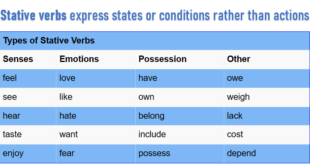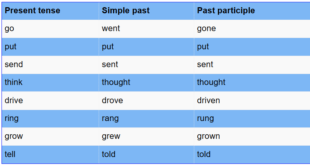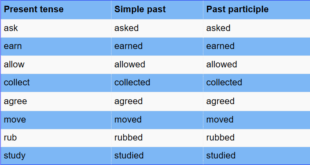Silent letters Silent letters, envocabulary.com
Read More »Stative verbs
Stative verbs (also called state verbs) express states or conditions rather than actions. I want some chocolate. I have a cellphone. We own this car. He needs more time. Types of Stative Verbs Senses Emotions Possession Other feel love have owe see like own weigh hear hate belong …
Read More »put off
put off (to postpone) You must not put off until tomorrow what you can do today. Let’s put off the picnic until the rain stops. envocabulary.com
Read More »Irregular verbs
Irregular verbs do not follow the -d, -ed, or -ied suffix pattern in their past and past participle forms. Present tense Simple past Past participle go went gone put put put send sent sent think thought thought drive drove driven ring rang rung grow grew grown tell told told To …
Read More »Regular verbs
Regular verbs have a usual ending in their past and past participle forms. Present tense Simple past Past participles ask asked asked earn earned earned allow allowed allowed collect collected collected agree agreed agreed move moved moved rub rubbed rubbed study studied studied For verbs that end in “e”, …
Read More »


